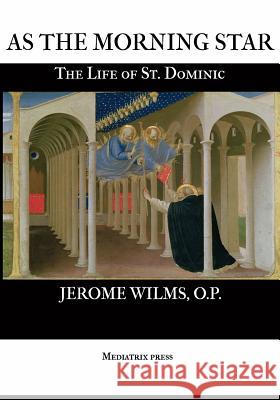As the Morning Star: The Life of St. Dominic » książka
As the Morning Star: The Life of St. Dominic
ISBN-13: 9781499367447 / Angielski / Miękka / 1956 / 170 str.
That after seven hundred years his life is still the subject of historians' endeavors is a clear proof of the deep significance of St. Dominic's personality for his Order, for the clergy, and the entire Church. He lived in the late Middle Ages, when the Chair of Peter was occupied by popes like Innocent III, whose prudence and firmness were active factors in shaping Europe's history. The spirit of faith still had at least a little influence in political matters, and enthusiasm for the reclaiming of the Holy Land swayed men's hearts. However, there were also ominous signs that a religious retrogression had begun. Heretics were stirring up trouble in different localities. Monastic discipline had become relaxed. Spiritual ministrations were being neglected, because the clergy were either entangled in worldly matters or had succumbed to the easy life made available to them by their rich revenues. The ancient landed property of the Church excited the greed of the pious donors' less devout offspring. Revolutionary ideas, hostile to the faith, were being propagated and put into practice, and well-disposed individuals were too ignorant of religious principles to steer themselves out of this dangerous current. By means of General Councils and Diocesan Synods, the Church had issued strict moral decrees for priests and religious concerning their pastoral duties and especially the preaching of the Gospel; but the end was not attained by merely issuing these decrees. Dominic was a man of action. He realized the need of the age and chose as his particular lifework the preaching of the Gospel. He established an Order, dedicated entirely to the salvation of souls by means of teaching and preaching the Word of God. With this foundation Dominic introduced an entirely new element into the history of religious orders. He retained the community life and solemn choral prayer of the Augustinian canons and adopted many austerities from the old monastic orders, but added to all this the stipulation that the particular task of his followers would be the salvation of their fellow men. For that purpose he obliged his disciples to devote themselves, rain or shine, to study and preaching. Dominic became the patriarch of apostolic orders. To all with whom he came in contact, to his brethren and to outsiders, he was in truth an openhanded and largehearted Father, wonderfully indulgent, but at the same time not yielding an inch in those things which mature deliberation had convinced him were necessary, and ready to attempt squaring a circle in order to carry out a worthy undertaking. Such a man has much to tell our own generation, perhaps everything needed for a genuine renewal. The present reprint is a fresh OCR by Mediatrix Press, not a facsimile reprint. It has been carefully edited to ensure its faithfulness to the original. Mediatrix Press specializes in reprints of old books and Latin titles that need to get back in print. Many more titles will be forthcoming.
Zawartość książki może nie spełniać oczekiwań – reklamacje nie obejmują treści, która mogła nie być redakcyjnie ani merytorycznie opracowana.











